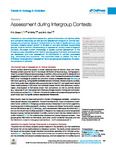Assessment during Intergroup Contests
| dc.contributor.author | Green, PA | |
| dc.contributor.author | Briffa, Mark | |
| dc.contributor.author | Cant, MA | |
| dc.date.accessioned | 2021-11-05T10:58:55Z | |
| dc.date.issued | 2021-02-01 | |
| dc.identifier.issn | 0169-5347 | |
| dc.identifier.issn | 1872-8383 | |
| dc.identifier.uri | http://hdl.handle.net/10026.1/18222 | |
| dc.description.abstract |
Research on how competitors assess (i.e., gather information on) fighting ability and contested resources, as well as how assessment impacts on contest processes and outcomes, has been fundamental to the field of dyadic (one-on-one) contests. Despite recent growth in studies of contests between social-living groups, there is limited understanding of assessment during these intergroup contests. We adapt current knowledge of dyadic contest assessment to the intergroup case, describing what traits of groups, group members, and resources are assessed, and how assessment is manifested in contest processes (e.g., behaviors) and outcomes. This synthesis helps to explain the role of individual heterogeneity in assessment and how groups are shaped by the selective pressure of contests. | |
| dc.format.extent | 139-150 | |
| dc.format.medium | Print-Electronic | |
| dc.language | en | |
| dc.language.iso | en | |
| dc.publisher | Cell Press | |
| dc.subject | aggression | |
| dc.subject | assessment | |
| dc.subject | dyadic contests | |
| dc.subject | intergroup contests | |
| dc.subject | social evolution | |
| dc.subject | Aggression | |
| dc.subject | Competitive Behavior | |
| dc.title | Assessment during Intergroup Contests | |
| dc.type | journal-article | |
| dc.type | Journal Article | |
| dc.type | Research Support, Non-U.S. Gov't | |
| dc.type | Review | |
| plymouth.author-url | https://www.webofscience.com/api/gateway?GWVersion=2&SrcApp=PARTNER_APP&SrcAuth=LinksAMR&KeyUT=WOS:000614372400007&DestLinkType=FullRecord&DestApp=ALL_WOS&UsrCustomerID=11bb513d99f797142bcfeffcc58ea008 | |
| plymouth.issue | 2 | |
| plymouth.volume | 36 | |
| plymouth.publication-status | Published | |
| plymouth.journal | Trends in Ecology and Evolution | |
| dc.identifier.doi | 10.1016/j.tree.2020.09.007 | |
| plymouth.organisational-group | /Plymouth | |
| plymouth.organisational-group | /Plymouth/Faculty of Science and Engineering | |
| plymouth.organisational-group | /Plymouth/Faculty of Science and Engineering/School of Biological and Marine Sciences | |
| plymouth.organisational-group | /Plymouth/REF 2021 Researchers by UoA | |
| plymouth.organisational-group | /Plymouth/REF 2021 Researchers by UoA/UoA04 Psychology, Psychiatry and Neuroscience | |
| plymouth.organisational-group | /Plymouth/Research Groups | |
| plymouth.organisational-group | /Plymouth/Research Groups/Marine Institute | |
| plymouth.organisational-group | /Plymouth/Users by role | |
| plymouth.organisational-group | /Plymouth/Users by role/Academics | |
| plymouth.organisational-group | /Plymouth/Users by role/Researchers in ResearchFish submission | |
| dc.publisher.place | England | |
| dcterms.dateAccepted | 2020-01-01 | |
| dc.rights.embargodate | 2021-11-6 | |
| dc.identifier.eissn | 1872-8383 | |
| dc.rights.embargoperiod | Not known | |
| rioxxterms.versionofrecord | 10.1016/j.tree.2020.09.007 | |
| rioxxterms.licenseref.uri | http://www.rioxx.net/licenses/all-rights-reserved | |
| rioxxterms.licenseref.startdate | 2021-02-01 | |
| rioxxterms.type | Journal Article/Review |


